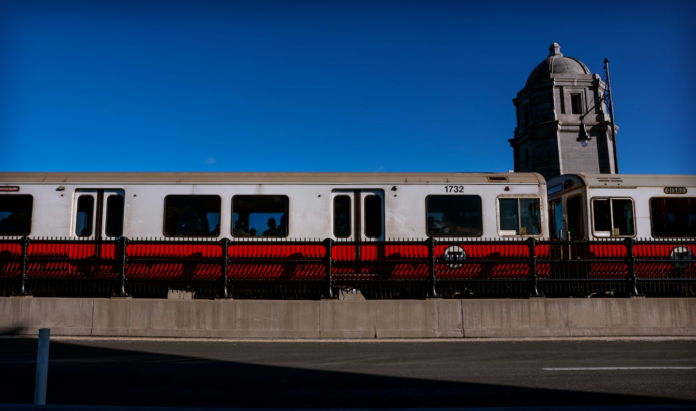The roadmap follows many recommendations from a 31-member transportation task force Healey appointed last yea r , which released its long-awaited report during the announcement.
At the Union Station train terminal in downtown Worcester, Healey outlined a financing plan totaling $8 billion in new investments over the next decade in the state’s roads, bridges, and regional transportation system.
Governor Maura Healey unveiled a novel transportation funding strategy on Tuesday: fully close the MBTA’s massive operating deficit and put the chronically underfunded transit agency on a path for long-term stability. The idea marks a dramatic shift from past approaches.
“This historic transportation proposal represents smart, forward-thinking fiscal management, and it will have an impact on people in all regions of our state,” Healey said.
At least in the short-run, the infusion of funds could be a game-changer, staving off job losses and service cuts at the agency, a byproduct of financial troubles in the past. Looking out several years, the plan calls for raising capital through new bonds.
The plan, which does not include raising new fees or taxes, sets up a three-tiered approach to transportation funding: stabilize, enhance, and transform the state’s transportation system.
Advertisement
To quickly stabilize infrastructure and operations statewide, the plan calls for tapping into a greater portion of the state’s so-called “millionaires tax,” a 4 percent additional tax on annual earnings exceeding $1 million.
The Fair Share Amendment was approved by voters in 2022 and has generated more money than initially projected. Currently, the proceeds are split between public education and transportation, with 59 percent going to education and 41 percent to transportation. The Healey administration is looking to adjust that to a near even divide.
Secretary of Administration and Finance Matthew Gorzkowicz, co-chair of the task force, and legislative leaders said last week they expect to collect $2.4 billion from the income surtax during the next fiscal year and agreed to cap spending at $1.95 billion.
With $1.3 billion in surplus available from the previous fiscal year, the Healey administration is proposing to inject the T with $780 million — money that would, among other things, replenish the agency’s budget reserves. Another $52 million would go to the Massachusetts Department of Transportation and $25 million would be invested in Regional Transit Authorities.
Advertisement
As it stands, the T’s day-to-day finances are in dire shape, as ridership and fare revenue still have not recovered since the pandemic, while the costs to run the system have increased. For now, officials continue to drain the T’s entire rainy day fund to cover day-to-day expenses, and estimate that the agency is staring at a $700 million shortfall in its next budget. Some critics point to chronic poor management, routine cost overruns, and excessive overtime pay for the T’s financial woes.
The T is also on the hook for debt plus interest from money it borrowed to pay for construction projects, including about $4 billion from projects it was required to take on for work related to the Big Dig. The governor’s plan calls for retiring that debt and floating new bonds by borrowing against revenue from the millionaires tax, raising $5 billion over the next five years to support capital investments.
Nationwide, transit agencies are facing similar challenges. New York, Minnesota, and Colorado have been touted by transit advocates for adopting a range of funding sources that provide long-term support for transportation needs, but ideas like congestion pricing and tolls remain just that in Massachusetts — ideas.
Still, many transportation advocates have expressed strong doubts about any strategy that puts too heavy of a focus on money from the millionaires tax.
Overall, the investments are projected to cover about 90 percent of the T’s operating deficit, with the agency expected to make up the rest to close the gap.
Beyond the daily cost of running the system, the T estimates it needs to spend $25 billion on infrastructure improvements to bring the current system to a state of good repair. Yet, in its five-year capital budget, the transit agency has said that it can only afford less than one-tenth of its needs.
Advertisement
In combination with leveraging additional borrowing, the surplus is expected be enough to stabilize the agency for several years, and also provide funds to help chip away at the daunting number of capital projects needed to modernize the system’s aging infrastructure, such as funding for track and power systems.
The proposed changes to the millionaires tax are now in the hands of state lawmakers.
One member of the task force from the Legislature, Senator Brendan Crighton, a Democrat from Lynn, previously told the Globe that “momentum has shifted greatly” among fellow lawmakers for funding the T.
“I do feel an incredibly increased sense of urgency in terms of the T’s spending deficit. We shouldn’t put the burden back on riders, whether it’s service cuts or any increases to their costs,” Crighton said. “It is time.”
Shannon Larson can be reached at shannon.larson@globe.com. Follow her @shannonlarson98.


